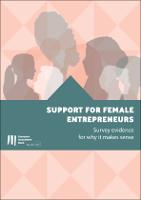Support for female entrepreneurs
Survey evidence for why it makes sense
Author(s)
European Investment Bank
Collection
Knowledge Unlatched (KU)Language
EnglishAbstract
Women’s economic empowerment has improved rapidly in the last century. Today, many women are not just fully engaged in the workplace; some lead international organisations, corporations and countries. But gender gaps, still prevalent in the European Union and other regions, are costly and imply foregone opportunities not only for women individually, but also for companies that do not fully leverage female talent, and for economies. After a century of impressive progress, overall economic opportunities for women are still lagging behind those of men. On average, women earn 13% less per hour in the European Union. Women are less often entrepreneurs and those that strive to grow their businesses or decide to lead companies face high barriers. Globally and across the European Union, we still have a way to go to achieve gender equality and empower women and girls, as stipulated by the UN Sustainable Development Goals and the European Pillar of Social Rights. Three surveys — the EIB Investment Survey (EIBIS) 2021, the EIBIS Startup and Scaleup Survey 2019 and the EBRD-EIB-World Bank Group Enterprise Survey — show that supporting female-led businesses makes good economic sense, as these companies generate wider economic, social and environmental benefits. Notably, support for female-led businesses can contribute to raising female labour force participation, thereby helping to reduce poverty risks. At the same time, framework conditions that make it easier for women to have professional careers, or establish and run a business successfully, are key to seeing more female-led businesses emerge and thrive.
Keywords
Business & Economics; EconomicsDOI
10.2867/854252ISBN
9789286153785, 9789286153785Publisher
European Investment BankPublisher website
https://www.eib.org/en/publications/index.htmPublication date and place
2022Grantor
Imprint
European Investment BankClassification
Economics


 Download
Download